“Reality is too contradictory for people to live just one life.”
Paris, 1960s

When you were working on your dissertation in the 1960s, writing on Virginia Woolf’s novels under the supervision of Roland Barthes and Lucien Goldmann, you were also a regular contributor to Les Lettres françaises, an arts and culture publication that was started in 1941 by the National Front as part of the resistance movement in the context of the Nazi occupation. Les Lettres françaises remained important after the war. It was funded by the French Communist Party and, when you were there, it was edited by Louis Aragon, one of the founders of Surrealism. I wonder if you could tell me about that experience and what it meant for you as an emerging writer and intellectual?
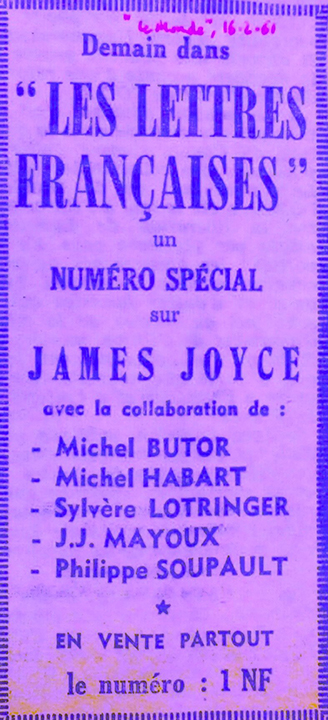
It’s difficult for people to realize what the Communist Party was in France, because here, communist is a bad word, right? In France it was different. Before the war, Stalin and Hitler made a pact and in 1939 the Communist Party was suddenly outlawed in France. So a number of people went into the French Resistance movement. Others were rounded up and sent to the camps. Aragon and Pierre Daix, who was the general editor of Les Lettres française, were among the people who were, in different ways, a part of this generation. The people who worked for Les Lettres françaises were much older than I was. I mean I was 20 and they were in their 50s and 60s. They were hardcore Communists, but they were not ideologically insensitive, so it was kind of pleasant. Les Lettres française was something like the liberal window of the Communist Party. And because of Aragon’s presence, it was pretty open to a lot of things.
But Aragon was on a tightrope. First of all he broke off with the Surrealists because of the Communist question. The Surrealists sided with the Communist Party in 1927. In the 30s it was just a budding party; it didn’t have many members and it didn’t have any sort of intellectual prestige attached to it. Breton was drawn to the party when it was trying to seduce people from the avant-garde, but it didn’t last very long. When Breton was kicked out of the Communist Party he broke off certain members, like Aragon, who sided with the Communist Party and stayed with the Communist Party while the others went towards Trotsky.
But Aragon was on a tightrope. First of all he broke off with the Surrealists because of the Communist question. The Surrealists sided with the Communist Party in 1927. In the 30s it was just a budding party; it didn’t have many members and it didn’t have any sort of intellectual prestige attached to it. Breton was drawn to the party when it was trying to seduce people from the avant-garde, but it didn’t last very long. When Breton was kicked out of the Communist Party he broke off certain members, like Aragon, who sided with the Communist Party and stayed with the Communist Party while the others went towards Trotsky.
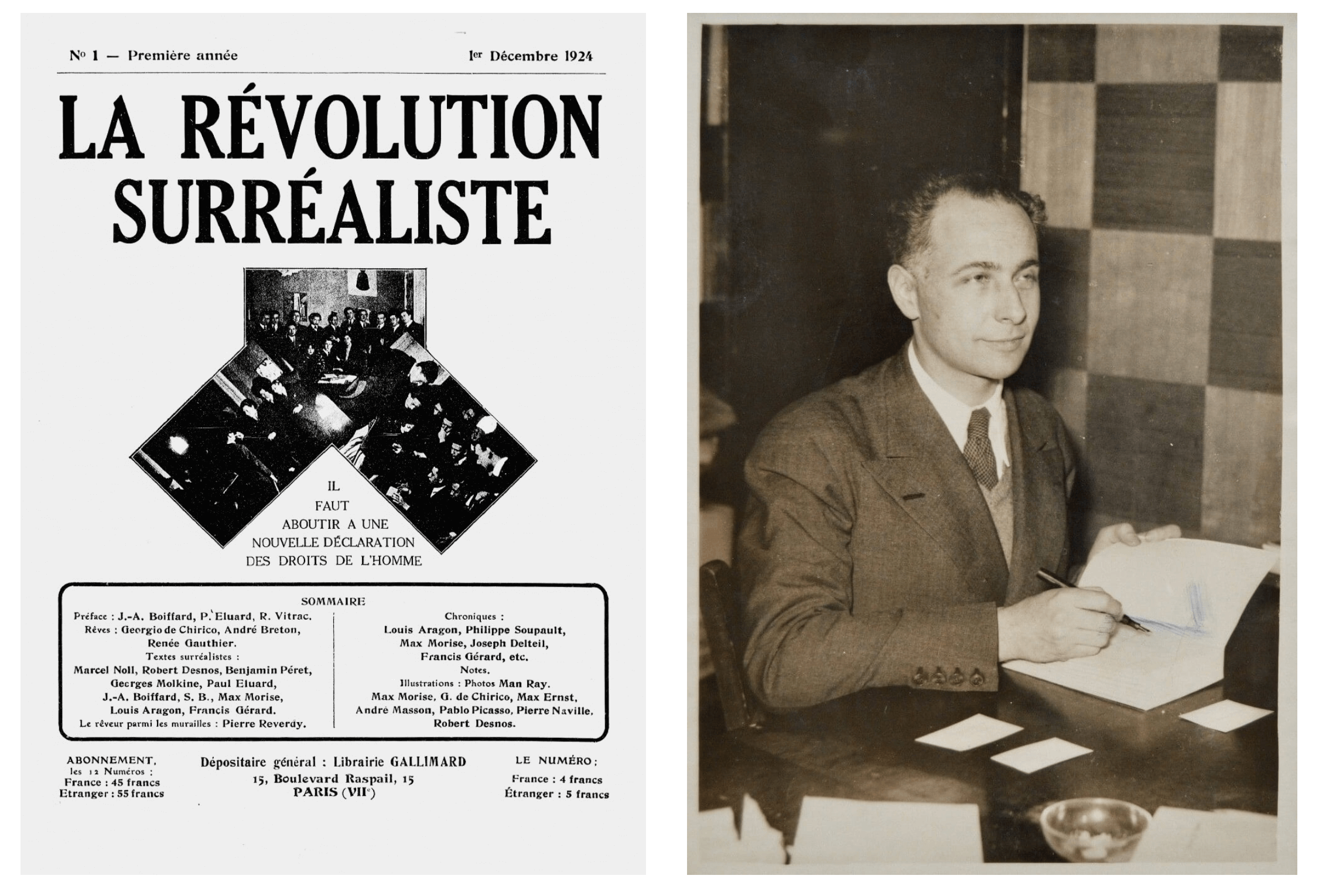

The political question was very important in France at the time. Even during the war, there were fights going on between the Gaullists, who were the more traditional if not conservative wing of the Resistance movement, installed in London, and the Communists, who were more rooted in the French countryside as farmers and workers. The Communist Party was victorious after the war, because at the last moment the French managed to insinuate themselves among the allies and claimed they had chased the Germans from France, which was not exactly true. But since it was not exactly true, after the war the Communist Party took a strident position in relation to what the French owed the Party. Most everyone was a Communist after the war. My parents, who were never Communists, became Communists; everyone who was on the side of the Resistance felt that they owed the Communist Party a lot.
Les Lettres françaises was created by Jacques Decour and Jean Paulhan. It came out of the Resistance and Aragon was, with Picasso, a major artist who was embraced by the Communist Party. He never defected from the Communist Party, although he was very often in contradiction with its politics. On top of that, Aragon was part of the Central Committee of the Communist Party, which decided on all the strategies of the Communist Party. So we had authority there. They gave him some freedom that they wouldn’t give to anyone else. But again, Aragon was on a tightrope, trying to open up the Communist Party to elements of what they considered the bourgeois society, of which I was a part, and at the same time he was also obliged to keep the line and not create too much trouble with innovations. I very rarely saw him, but he appeared for staff meetings. He’s not of an aristocratic family at all but he came with a cape, and it was always a surprise to see him, a Communist of the Central Committee of the Communist Party coming to meetings in high class uniform. They kind of locked themselves up in velvet rooms.
A double life.
He did show the strange situation he was in. On the one hand, he was unconditional, on the other, he had to be more faithful to his own history. He was trying to open the magazine up to what was happening outside and not just in relation to Russia. But Aragon never resigned from the Communist Party after Khrushchev denounced Stalin, nor did he resign after the Soviet occupation of Hungary in 1956.
Les Lettres françaises was created by Jacques Decour and Jean Paulhan. It came out of the Resistance and Aragon was, with Picasso, a major artist who was embraced by the Communist Party. He never defected from the Communist Party, although he was very often in contradiction with its politics. On top of that, Aragon was part of the Central Committee of the Communist Party, which decided on all the strategies of the Communist Party. So we had authority there. They gave him some freedom that they wouldn’t give to anyone else. But again, Aragon was on a tightrope, trying to open up the Communist Party to elements of what they considered the bourgeois society, of which I was a part, and at the same time he was also obliged to keep the line and not create too much trouble with innovations. I very rarely saw him, but he appeared for staff meetings. He’s not of an aristocratic family at all but he came with a cape, and it was always a surprise to see him, a Communist of the Central Committee of the Communist Party coming to meetings in high class uniform. They kind of locked themselves up in velvet rooms.
A double life.
He did show the strange situation he was in. On the one hand, he was unconditional, on the other, he had to be more faithful to his own history. He was trying to open the magazine up to what was happening outside and not just in relation to Russia. But Aragon never resigned from the Communist Party after Khrushchev denounced Stalin, nor did he resign after the Soviet occupation of Hungary in 1956.
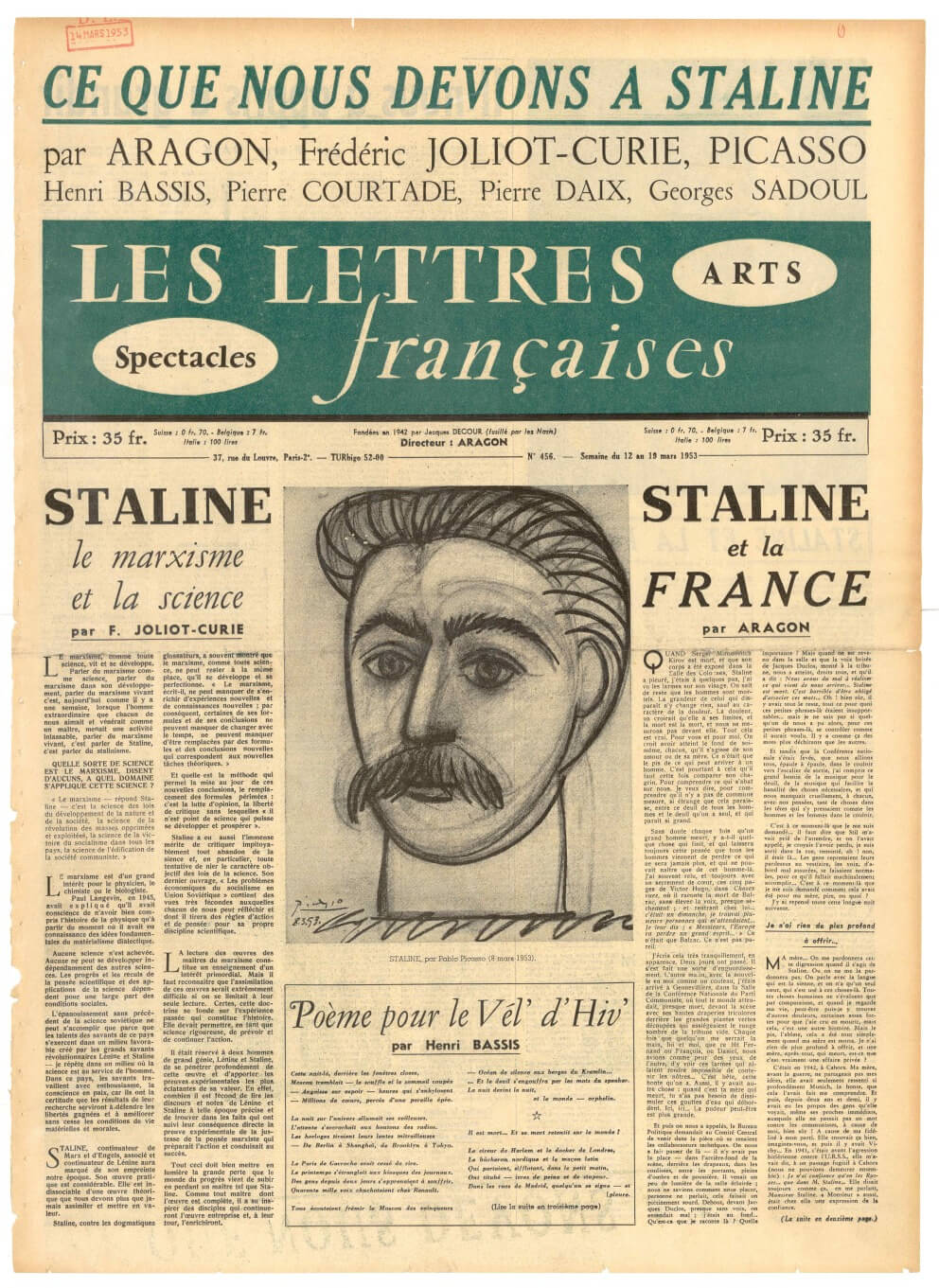


Above, Pablo Picasso holding his drawing of Stalin for a 1953 Les Lettres françaises cover, following Stalin’s death. A Stalin monument was torn down in October 1956, in Budapest, Hungary during a nation-wide revolution against Soviet-imposed policies
There were heavy demonstrations in Paris against the occupation, directed at the Communist Party, since it didn’t take a position. Aragon himself took a more avant-garde position. I think he realized that the Russians had made a mistake by crushing the Hungarian Revolution. It was a turning point in France, and I felt very divided, because we were all either in the Communist Party or very close to it. Jean-Paul Sartre was not in the Communist Party, but he was a fellow traveler. You have to see the whole environment as very politicized. Being in Les Lettres françaises could have been taken as a statement that you were a Communist. In fact, not all of the people working there were Communists. I think the ones who were the most Communist were those who were working on the typesetting of the magazine.
I wasn’t involved with politics there but I had been brought up in a very leftist Zionist group [Hashomer-Hatzair] for about ten years, so I was still imbued with a faith in the Soviet Union and the lifestyle of the Soviet youth. We didn’t embrace it entirely, but we were very influenced by it. I remember going with a big crowd, walking down the Boulevard Montmartre at night, protesting against the Communist Party, and I felt divided and ambivalent. I didn’t like what they were doing but at the same time I would have never thought of attacking the Communist Party, so that was that.
Is it true that you originally wanted to be a mason?
I had to have an excuse with my parents. My parents didn’t want to let me go if I didn’t have a profession, and it was true that it was not a good idea to just go to Israel and have nothing to lean on except being a peasant, basically. We hadn’t been trained to be peasants, in spite of the ideology of the mouvement [Hashomer-Hatzair]. We went to lycées, we had classes in literature and philosophy; we were budding intellectuals. To go straight into working on the field wasn’t exactly what we had in mind, but we were divided and felt guilty about the thought of leaving the mouvement. So at that time I was trained to be directing people, in the sense that I was trained to become a leader. We were very disciplined. We were also trained athletically to be ready for the next war.
I wasn’t involved with politics there but I had been brought up in a very leftist Zionist group [Hashomer-Hatzair] for about ten years, so I was still imbued with a faith in the Soviet Union and the lifestyle of the Soviet youth. We didn’t embrace it entirely, but we were very influenced by it. I remember going with a big crowd, walking down the Boulevard Montmartre at night, protesting against the Communist Party, and I felt divided and ambivalent. I didn’t like what they were doing but at the same time I would have never thought of attacking the Communist Party, so that was that.
Is it true that you originally wanted to be a mason?
I had to have an excuse with my parents. My parents didn’t want to let me go if I didn’t have a profession, and it was true that it was not a good idea to just go to Israel and have nothing to lean on except being a peasant, basically. We hadn’t been trained to be peasants, in spite of the ideology of the mouvement [Hashomer-Hatzair]. We went to lycées, we had classes in literature and philosophy; we were budding intellectuals. To go straight into working on the field wasn’t exactly what we had in mind, but we were divided and felt guilty about the thought of leaving the mouvement. So at that time I was trained to be directing people, in the sense that I was trained to become a leader. We were very disciplined. We were also trained athletically to be ready for the next war.
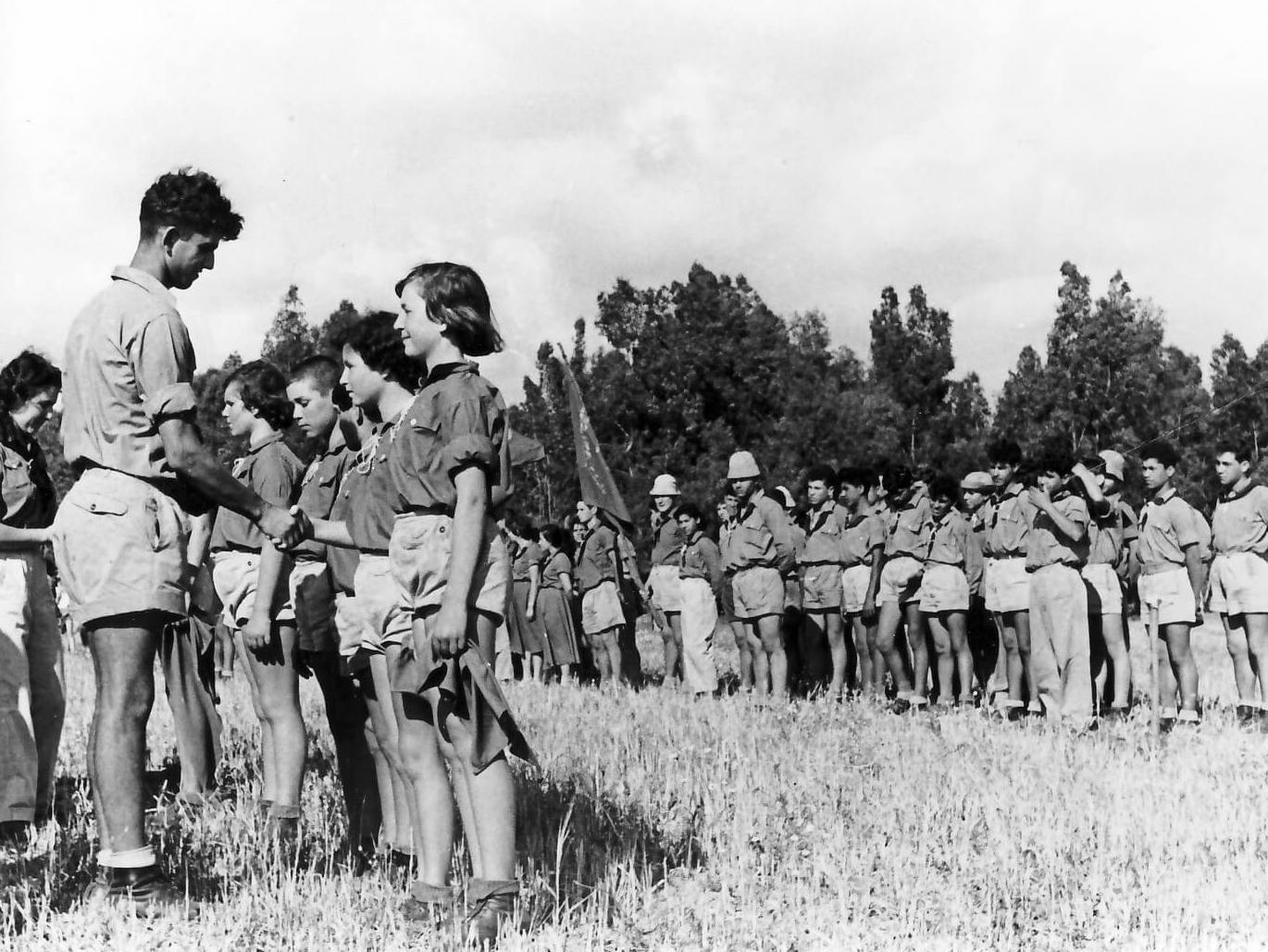
We were given a paratrooper kind of training, going up and jumping from trees, going up walls, using bunkers on the beach as a training ground, but more like people who would have to get into another war soon and would avoid being so helpless in the next one. It wasn’t so great being Jewish at the end of the war and seeing that six million people were slaughtered. You didn’t have the feeling they resisted. The movement played on that, too. It played on the fact that we felt kind of humiliated. They always said that you need to go and, you know, be real men who weren’t pushed like cattle into concentration camps. That was a part of the politics. So when I had to leave the movement, I didn’t want to — but they didn’t give me a choice.
When I left I arrived at the Sorbonne. It was 1957, the time of Hungary. I had all this energy, because in the movement we were very active. We were like scouts. We were sleeping overnight and having lots of discussions about sex, about Jews, about politics and this and that. I had all this unspent energy so it was great to discover the Sorbonne where there were so many things happening. They elected me president of the first year at the Sorbonne.
President of?
Of the students.
You were charismatic?
No, I was doing drawings. There was a newspaper, Paris Lettres, which was the magazine of the Sorbonne, and I was making posters because I know how to draw. My first magazine was in the mouvement. I made it all by myself, mimeographed. I wrote articles against Jean-Paul Sartre, who I didn’t think was leftist enough. I typed and made drawings and distributed the magazine to all my comrades.
This was before Les Lettres françaises?
Before Les Lettres Françaises. So I already had some training in journalism, and since I had some gifts with drawing, I offered to make some drawings for Paris Lettres. I started like this, and then they gave me more to do. I started writing articles, doing inquiries, and conducting interviews with some writers of interest at the time, like Nathalie Sarraute, Michel Butor, Robbe-Grillet, etc.
When I left I arrived at the Sorbonne. It was 1957, the time of Hungary. I had all this energy, because in the movement we were very active. We were like scouts. We were sleeping overnight and having lots of discussions about sex, about Jews, about politics and this and that. I had all this unspent energy so it was great to discover the Sorbonne where there were so many things happening. They elected me president of the first year at the Sorbonne.
President of?
Of the students.
You were charismatic?
No, I was doing drawings. There was a newspaper, Paris Lettres, which was the magazine of the Sorbonne, and I was making posters because I know how to draw. My first magazine was in the mouvement. I made it all by myself, mimeographed. I wrote articles against Jean-Paul Sartre, who I didn’t think was leftist enough. I typed and made drawings and distributed the magazine to all my comrades.
This was before Les Lettres françaises?
Before Les Lettres Françaises. So I already had some training in journalism, and since I had some gifts with drawing, I offered to make some drawings for Paris Lettres. I started like this, and then they gave me more to do. I started writing articles, doing inquiries, and conducting interviews with some writers of interest at the time, like Nathalie Sarraute, Michel Butor, Robbe-Grillet, etc.

Paris Lettres sent me to Grenoble, because there was a student festival and they asked me to report on it, and since I was there, I decided I would report on it for other papers. So I wrote for Combat, a publication directed by Albert Camus, and there were three or four other magazines as well. The one that gave me the most space was Les Lettres françaises. They were very kind, but they were also like father figures. I was very young and had never worked as a journalist. They said, well, if you want to write something else, why don’t you send it to us? They were very open-ended. So I got into the habit of going there, since I was interested in what was happening culturally and they had not been introduced to this by the writers or the freelancers that they had. So I said okay, I could do this and I could do that.
Were you politically active at the time?
Yes. It was 1961, the middle of the Algerian War, and I was so involved in demonstrations, organizing, and all of that. This grew out of my earlier experience with the mouvement, because we were very political and active — I just never had time to study. It was a bit contradictory. I stayed in France because I was supposed to study and basically I knew the teachers would have given me a pass to any exam I wanted. But after a while I felt that I was missing a good opportunity to develop. And also, after a few years of working for Les Lettres françaises, my mind was becoming like a series of drawers. I open the drawer on Butor and close it. I open the drawer on Ionesco and I close it. But I didn’t have a culture. I had this series of things. I decided it would be a better idea to become a teacher, because then you have more time to study ... or at least that’s what I thought.
In any case, Paris Lettres was about the student movement and there’s a lot I did that was about Algeria. We were flaunting the censorship and we were going out every day, confronting the police, and the police were no soft deal. They were coming and running over us with motorbikes, and we were battling with sticks and running away, and coming back.
You were fighting for Algerian independence?
Yes. And I had a number of friends who got killed at the time. So in 1961 I thought, maybe I need to take a break? I couldn’t spend all of my time demonstrating, because I wouldn’t learn anything, so I applied for a job as an exchange student in Scotland. I was in Scotland for a year. This was a revelation, for I was on my own and I had never been on my own before. Most people grow in a family, I grew in a movement. There were 200–300 of us, everything was socialized, everything was discussed. And it was fairly puritanical on top of that. So I was pretty new to everything. When I stopped for a year to get a breather, I realized that it was not so bad to be by yourself. I started reading a lot. I had time to think and I had time to write, and that kind of changed my life. When I came back to Paris from Scotland, I picked up where I left things. They wanted me to become not only the head of Paris Lettres but the head of the whole student movement. I thought if I did I would become a journalist, and I didn’t want to do that. So I just peddled down my involvement with the student movement. The Algerian War also came to an end.
I spent 1962-63 in the States, with my second job, which was in Fairfield, Iowa. I had finished all my exams at the Sorbonne and all I had to do was write my PhD, only that wasn’t good enough for the army. So I left for the States, hoping I would teach in Mississippi because I was crazy about Faulkner. But for all sorts of reasons I finally ended up in Iowa, which was maybe better for me, since I thought I would spend a year in the States and defect, to stay there. But just as I was about to have to make a decision, the Évian Accords were signed with the Algerian rebels, so I came back to France. Then for two years I studied at the École Pratique des Hautes Études with Barthes and Goldmann, and I started taking classes for my dissertation, which I finished in Turkey. So it’s all these things happening in such a few years.
I’m curious about the magazine you started in Paris in 1961, which you called L’Etrave. What was the idea behind that project?
I founded it with friends a few months after I became president of the students at the Sorbonne, because I was always ambivalent. I was very political, but at the same time I was very interested in literature, in art, and things like that. So I had some friends among the first-year students and we decided to create another magazine. We started out with a number of people who had some contacts, and then others we found interesting came in. Luc Boltanski, the sociologist, was involved, and some of the people who worked on L’Etrave went on to work with Tel Quel. The idea was that we were interested in what was happening at the time, when lots of things were coming to France from Ireland. It was the time of Joyce, Brendan Behan, J.M. Synge; in Paris there was Ionesco, Arthur Adamov — Adamov who was involved with Artaud, although I didn’t know it then. There was Beckett. It was the mid-50s and France was waking up a bit.
So it was a literary magazine?
It was a literary magazine, not theory.
What does L’Etrave mean?
L’Etrave means spear, like the one you have on the front of a boat. You know — it was like we were the avant-garde. But it was fun. I liked the people who worked on the publication. We were meeting here and there, and then when I left for Turkey, someone else took over. I remained connected, but it didn’t have as much importance in my life. I didn’t mention something. Already when I was in a philosophy class in the last year of lycée, I was recruited by one of my colleagues to come to Georges Perec’s La Ligne général. I think his name was Barthélémy. He was Perec’s right-hand man and he was recruiting kids my age. Actually we were in the same class and were kind of fighting for the first prize. I was first in literature and he was first in philosophy, but we had doubled-up on the class. Anyway, they were looking for people to create a magazine called La Ligne général, The General Line, according to — what’s his name, the Soviet?
Sergei Eisenstein.
Eisenstein. So La Ligne général [1959–1963] was a title coming from one of Eisenstein’s films [The General Line, 1929]. The group was very close to the Communist Party. Perec was a dominant figure, and he wanted to have the approval of the Communist Party if we created a new magazine. But the Communist Party was not eager to see a young, bourgeois magazine on the left, so they said no, we don’t want it, and the magazine never came out. In fact we were a bit too immature. When we were supposed to write a special issue on Alain Resnais’s Hiroshima, mon amour [1959], which had just been released, we were a bit embarrassed. We had never written articles.
Were you politically active at the time?
Yes. It was 1961, the middle of the Algerian War, and I was so involved in demonstrations, organizing, and all of that. This grew out of my earlier experience with the mouvement, because we were very political and active — I just never had time to study. It was a bit contradictory. I stayed in France because I was supposed to study and basically I knew the teachers would have given me a pass to any exam I wanted. But after a while I felt that I was missing a good opportunity to develop. And also, after a few years of working for Les Lettres françaises, my mind was becoming like a series of drawers. I open the drawer on Butor and close it. I open the drawer on Ionesco and I close it. But I didn’t have a culture. I had this series of things. I decided it would be a better idea to become a teacher, because then you have more time to study ... or at least that’s what I thought.
In any case, Paris Lettres was about the student movement and there’s a lot I did that was about Algeria. We were flaunting the censorship and we were going out every day, confronting the police, and the police were no soft deal. They were coming and running over us with motorbikes, and we were battling with sticks and running away, and coming back.
You were fighting for Algerian independence?
Yes. And I had a number of friends who got killed at the time. So in 1961 I thought, maybe I need to take a break? I couldn’t spend all of my time demonstrating, because I wouldn’t learn anything, so I applied for a job as an exchange student in Scotland. I was in Scotland for a year. This was a revelation, for I was on my own and I had never been on my own before. Most people grow in a family, I grew in a movement. There were 200–300 of us, everything was socialized, everything was discussed. And it was fairly puritanical on top of that. So I was pretty new to everything. When I stopped for a year to get a breather, I realized that it was not so bad to be by yourself. I started reading a lot. I had time to think and I had time to write, and that kind of changed my life. When I came back to Paris from Scotland, I picked up where I left things. They wanted me to become not only the head of Paris Lettres but the head of the whole student movement. I thought if I did I would become a journalist, and I didn’t want to do that. So I just peddled down my involvement with the student movement. The Algerian War also came to an end.
I spent 1962-63 in the States, with my second job, which was in Fairfield, Iowa. I had finished all my exams at the Sorbonne and all I had to do was write my PhD, only that wasn’t good enough for the army. So I left for the States, hoping I would teach in Mississippi because I was crazy about Faulkner. But for all sorts of reasons I finally ended up in Iowa, which was maybe better for me, since I thought I would spend a year in the States and defect, to stay there. But just as I was about to have to make a decision, the Évian Accords were signed with the Algerian rebels, so I came back to France. Then for two years I studied at the École Pratique des Hautes Études with Barthes and Goldmann, and I started taking classes for my dissertation, which I finished in Turkey. So it’s all these things happening in such a few years.
I’m curious about the magazine you started in Paris in 1961, which you called L’Etrave. What was the idea behind that project?
I founded it with friends a few months after I became president of the students at the Sorbonne, because I was always ambivalent. I was very political, but at the same time I was very interested in literature, in art, and things like that. So I had some friends among the first-year students and we decided to create another magazine. We started out with a number of people who had some contacts, and then others we found interesting came in. Luc Boltanski, the sociologist, was involved, and some of the people who worked on L’Etrave went on to work with Tel Quel. The idea was that we were interested in what was happening at the time, when lots of things were coming to France from Ireland. It was the time of Joyce, Brendan Behan, J.M. Synge; in Paris there was Ionesco, Arthur Adamov — Adamov who was involved with Artaud, although I didn’t know it then. There was Beckett. It was the mid-50s and France was waking up a bit.
So it was a literary magazine?
It was a literary magazine, not theory.
What does L’Etrave mean?
L’Etrave means spear, like the one you have on the front of a boat. You know — it was like we were the avant-garde. But it was fun. I liked the people who worked on the publication. We were meeting here and there, and then when I left for Turkey, someone else took over. I remained connected, but it didn’t have as much importance in my life. I didn’t mention something. Already when I was in a philosophy class in the last year of lycée, I was recruited by one of my colleagues to come to Georges Perec’s La Ligne général. I think his name was Barthélémy. He was Perec’s right-hand man and he was recruiting kids my age. Actually we were in the same class and were kind of fighting for the first prize. I was first in literature and he was first in philosophy, but we had doubled-up on the class. Anyway, they were looking for people to create a magazine called La Ligne général, The General Line, according to — what’s his name, the Soviet?
Sergei Eisenstein.
Eisenstein. So La Ligne général [1959–1963] was a title coming from one of Eisenstein’s films [The General Line, 1929]. The group was very close to the Communist Party. Perec was a dominant figure, and he wanted to have the approval of the Communist Party if we created a new magazine. But the Communist Party was not eager to see a young, bourgeois magazine on the left, so they said no, we don’t want it, and the magazine never came out. In fact we were a bit too immature. When we were supposed to write a special issue on Alain Resnais’s Hiroshima, mon amour [1959], which had just been released, we were a bit embarrassed. We had never written articles.

I went to a few meetings for La Ligne général — we actually met on the street where my parents lived — but I eventually dropped out. It was interesting because I didn’t know anything about Perec at the time. Nor did I know anything about the Situationists.
How did you first encounter the work of Antonin Artaud?
I knew a woman in the student movement and I think she wanted to play the role of Joan of Arc — she was auditioning for Bresson’s film [Procès de Jeanne d’Arc, 1962].
How did you first encounter the work of Antonin Artaud?
I knew a woman in the student movement and I think she wanted to play the role of Joan of Arc — she was auditioning for Bresson’s film [Procès de Jeanne d’Arc, 1962].

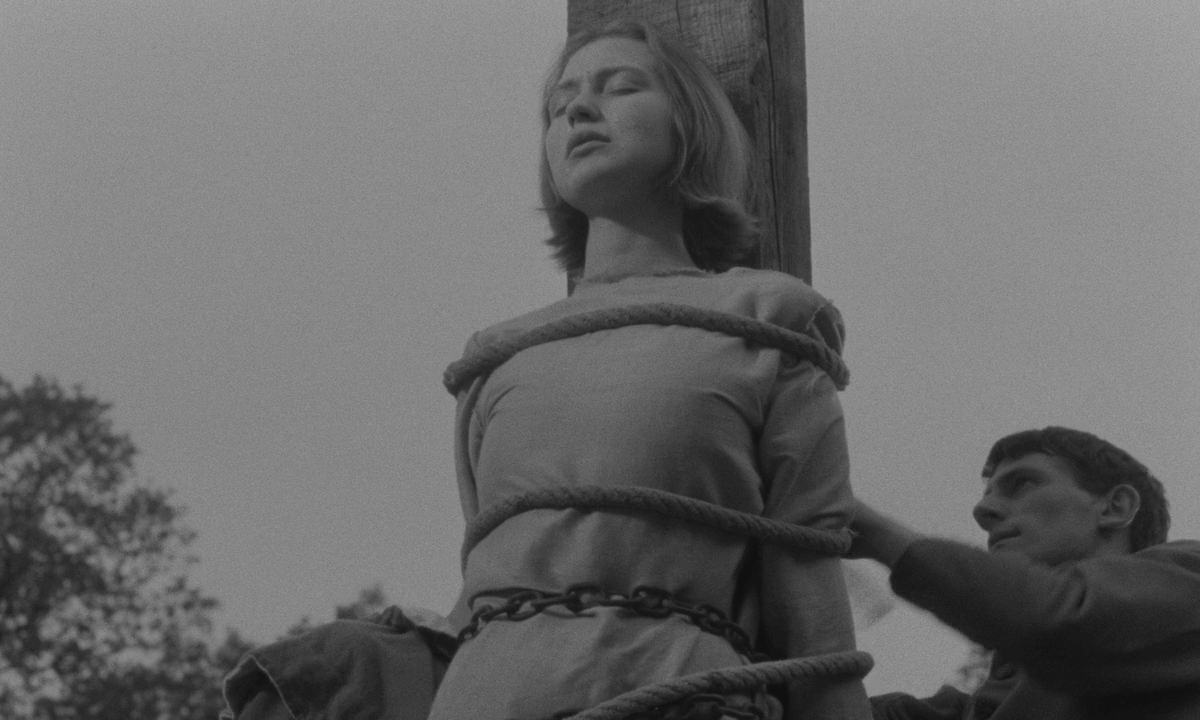
Florence Delay as Joan of Arc in Procès de Jeanne d'Arc (Robert Bresson, 1962), released in the U.S. in 1965 as The Trial of Joan of Arc.
She was stunningly beautiful, I remember, and I felt kind of small compared to her, because she was so glamorous. Of course I had no sexual experience until late, coming from a very puritanical movement. We weren’t trained in the American way of dating. We were total savages compared to the Americans, or compared to the other French. We were like another kind of race, if I may say so; we had been brought up very differently. Anyway I saw Bresson’s film at the Cinémathèque, where I was going fairly often, so I first encountered Artaud incidentally, from something else, from Joan of Arc.


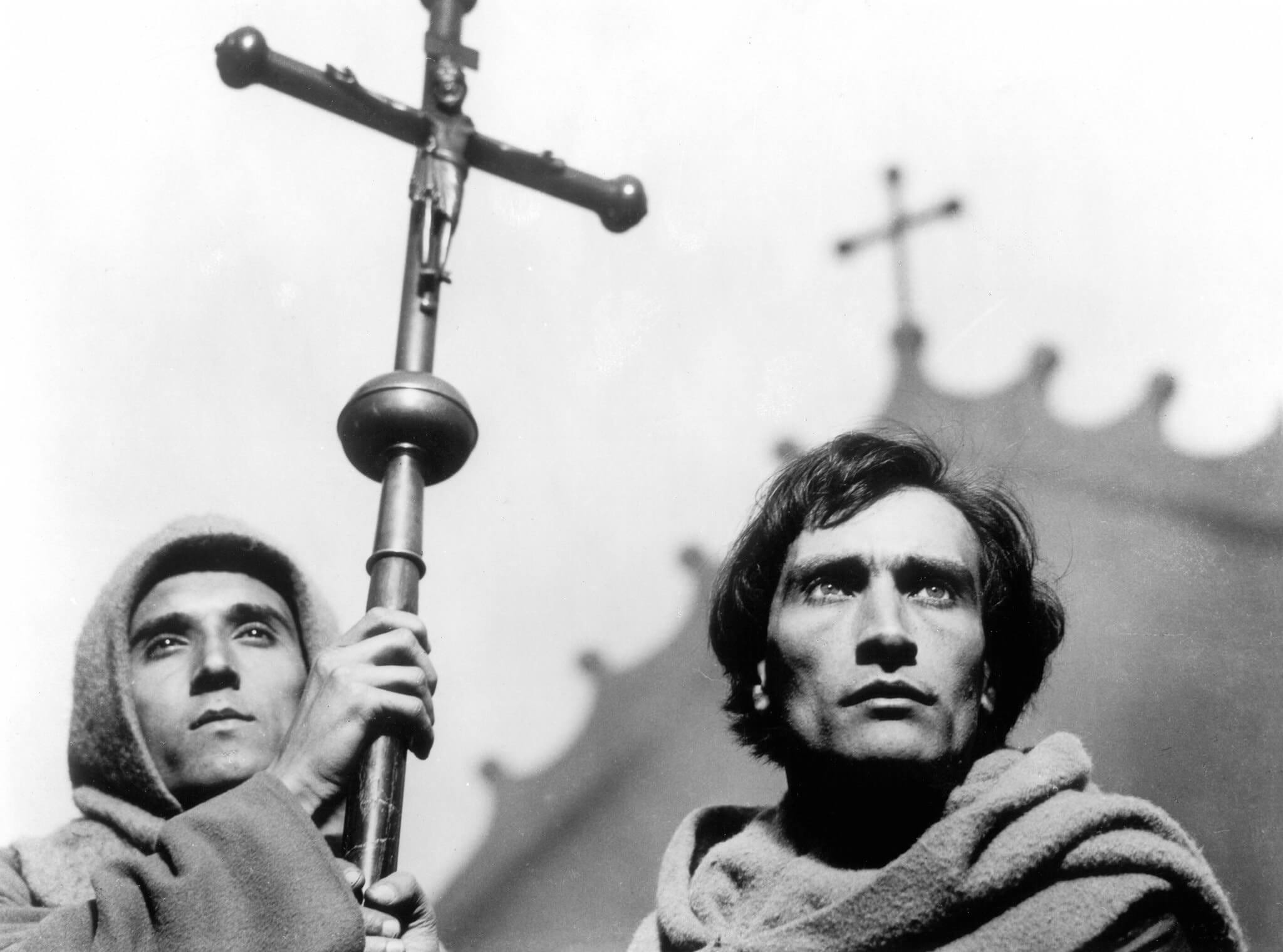
Are you referring to the Cinémathèque started by Henri Langlois and Georges Franju?
Yes, it was very popular among students. It was in the Latin Quarter and we would go there at night. We were there all the time. Actually another guy, a sociologist, took me there. What was his name? He was a sociologist, kind of a pedophile, then a Trotskyite... Georges Lapassade. He had an importance in my life in a roundabout way.
I had failed my baccalaureate because I wasn’t prepared for it, because I was in the mouvement and they were about to go to Israel, so I was active with that, with them, and as a result I had to spend the summer with my parents in Nice, rehearsing everything. The guy who interrogated me at the exam in September was Georges Lapassade, and he entered my life at a moment when I was about to grudgingly terminate eight to ten years of my life with the mouvement. I felt very guilty about this. I mean no one knew that Zionism was a bad thing. We were coming straight from the War then; it was just a logical thing to do.
So Lapassade interrogated me for the oral. The written part of the dissertation was devoted to the question: What is an ideal? And for me, who was brought up in a radical movement, I thought: ideal? I was idealistic! No problem! So I wrote along these lines, but they didn’t like it. The one who selected this subject was Georges Lapassade. He said, well, maybe you should come with me — I’m forming a little group. He was a sociologist and a psychiatrist of sorts. He was putting together a group of people who were dissidents from where they belonged. There were students from the Communist youth, and I was there as a Zionist heretic. So once a week we were gathering to have discussions. He was training in Jacob Moreno’s theory of group sociology, group therapy. He was observing us and pointing to us as we were speaking and there were always these dynamic things happening with the group. Of course I’ve always been involved in a group and have even been leader of the group, but after a while I got annoyed that Lapassade was not paying attention to what we were saying; he was only paying attention to the dynamics of it.
At one point I didn’t know what to do about the mouvement, if that’s even what it’s called, and he said, Why don’t you send a letter saying that you resign? And I thought, resign? It was like asking me to resign from my family. Dear father and mother, I’m going to resign as your son. The idea hadn’t crossed my head. We were so tightly wound together. We were meeting two, three, four times a week for years. It was so incestuous. You don’t break up with people who are just like you. I remember going to my parents’ apartment and typing a letter to resign. I sent it to the movement and they called me up and asked, who told you to do such a thing?
So at that time I said, Okay, I’ll stay, but I want to go to the University. And they said, Okay, we’ll think about it. Then they sent me to Alsace-Lorraine, which is what my name means — Lorraine is Lotringer in German. But they didn’t send me to the city where there was a university, they sent me to the other city where there was no university. It was like they were trying to trick me. So I said No, I’m going to leave, and I left. But again, part of the reason I was interested in the student movement is that I felt bad having rejected everybody I’d been with for so long. Most of the people who left the mouvement at that time went to the Trotskyites. But the Trotskyites were not in good water with us. I was too much of a Leninist.
Politically and culturally, it was a very conflicting time. I rushed into so many activities at the same time, because I was capable, and it made me feel like I was still part of something. I connected with a sociologist, Claude Burgelin, who wrote a book on Perec and was an associate of Roland Barthes, and he was directing a place in the Latin Quarter called Maison des Lettres, a beautiful place just ten minutes from the Sorbonne where we invited writers, philosophers, artists, and actors to talk to students. My experience at Maison des Lettres was very formative, because not only did I connect with people for L’Etrave, but I was encouraged to invite people to lecture, and to create series. For instance, I created the first series on the Nouvelle critique, with Roland Barthes, Lucien Goldmann, Georges Poulet, and Jean Starobinski.
It sounds like the Maison des Lettres was a special place.
Yes, I think Jeanne Mureau eventually bought it. Lots of people from the intelligentsia used to lecture there. I met Umberto Ecco at Maison des Lettres very early on, in the 50s. It’s where Roland Barthes gave his first lectures about fashion. Nathalie Sarraute, Robbe-Grillet — it was basically the student outlet. I always tried to decipher elements in what was happening at the time that could interest students.
What years were these?
It was 1958-59.
The moment of the French New Wave. Were any of them involved?
I met Alain Resnais, because they were forced to sell the Maison des Lettres and I tried to gather some people who had been present. I knew Godard, but not personally. I went to the first screening of Alphaville [1965] and asked Godard a question. I thought he was — well, at the time we took him as a sort of fascist. He wasn’t enough of a political political. But I remember that Goldmann was there too, because Goldmann was interested in Godard and the New Novel. I was working with these people and had become close friends with Nathalie Sarraute after I interviewed her for L’Etrave. Actually she’s the one who told me to read Virginia Woolf.
Yes, it was very popular among students. It was in the Latin Quarter and we would go there at night. We were there all the time. Actually another guy, a sociologist, took me there. What was his name? He was a sociologist, kind of a pedophile, then a Trotskyite... Georges Lapassade. He had an importance in my life in a roundabout way.
I had failed my baccalaureate because I wasn’t prepared for it, because I was in the mouvement and they were about to go to Israel, so I was active with that, with them, and as a result I had to spend the summer with my parents in Nice, rehearsing everything. The guy who interrogated me at the exam in September was Georges Lapassade, and he entered my life at a moment when I was about to grudgingly terminate eight to ten years of my life with the mouvement. I felt very guilty about this. I mean no one knew that Zionism was a bad thing. We were coming straight from the War then; it was just a logical thing to do.
So Lapassade interrogated me for the oral. The written part of the dissertation was devoted to the question: What is an ideal? And for me, who was brought up in a radical movement, I thought: ideal? I was idealistic! No problem! So I wrote along these lines, but they didn’t like it. The one who selected this subject was Georges Lapassade. He said, well, maybe you should come with me — I’m forming a little group. He was a sociologist and a psychiatrist of sorts. He was putting together a group of people who were dissidents from where they belonged. There were students from the Communist youth, and I was there as a Zionist heretic. So once a week we were gathering to have discussions. He was training in Jacob Moreno’s theory of group sociology, group therapy. He was observing us and pointing to us as we were speaking and there were always these dynamic things happening with the group. Of course I’ve always been involved in a group and have even been leader of the group, but after a while I got annoyed that Lapassade was not paying attention to what we were saying; he was only paying attention to the dynamics of it.
At one point I didn’t know what to do about the mouvement, if that’s even what it’s called, and he said, Why don’t you send a letter saying that you resign? And I thought, resign? It was like asking me to resign from my family. Dear father and mother, I’m going to resign as your son. The idea hadn’t crossed my head. We were so tightly wound together. We were meeting two, three, four times a week for years. It was so incestuous. You don’t break up with people who are just like you. I remember going to my parents’ apartment and typing a letter to resign. I sent it to the movement and they called me up and asked, who told you to do such a thing?
So at that time I said, Okay, I’ll stay, but I want to go to the University. And they said, Okay, we’ll think about it. Then they sent me to Alsace-Lorraine, which is what my name means — Lorraine is Lotringer in German. But they didn’t send me to the city where there was a university, they sent me to the other city where there was no university. It was like they were trying to trick me. So I said No, I’m going to leave, and I left. But again, part of the reason I was interested in the student movement is that I felt bad having rejected everybody I’d been with for so long. Most of the people who left the mouvement at that time went to the Trotskyites. But the Trotskyites were not in good water with us. I was too much of a Leninist.
Politically and culturally, it was a very conflicting time. I rushed into so many activities at the same time, because I was capable, and it made me feel like I was still part of something. I connected with a sociologist, Claude Burgelin, who wrote a book on Perec and was an associate of Roland Barthes, and he was directing a place in the Latin Quarter called Maison des Lettres, a beautiful place just ten minutes from the Sorbonne where we invited writers, philosophers, artists, and actors to talk to students. My experience at Maison des Lettres was very formative, because not only did I connect with people for L’Etrave, but I was encouraged to invite people to lecture, and to create series. For instance, I created the first series on the Nouvelle critique, with Roland Barthes, Lucien Goldmann, Georges Poulet, and Jean Starobinski.
It sounds like the Maison des Lettres was a special place.
Yes, I think Jeanne Mureau eventually bought it. Lots of people from the intelligentsia used to lecture there. I met Umberto Ecco at Maison des Lettres very early on, in the 50s. It’s where Roland Barthes gave his first lectures about fashion. Nathalie Sarraute, Robbe-Grillet — it was basically the student outlet. I always tried to decipher elements in what was happening at the time that could interest students.
What years were these?
It was 1958-59.
The moment of the French New Wave. Were any of them involved?
I met Alain Resnais, because they were forced to sell the Maison des Lettres and I tried to gather some people who had been present. I knew Godard, but not personally. I went to the first screening of Alphaville [1965] and asked Godard a question. I thought he was — well, at the time we took him as a sort of fascist. He wasn’t enough of a political political. But I remember that Goldmann was there too, because Goldmann was interested in Godard and the New Novel. I was working with these people and had become close friends with Nathalie Sarraute after I interviewed her for L’Etrave. Actually she’s the one who told me to read Virginia Woolf.
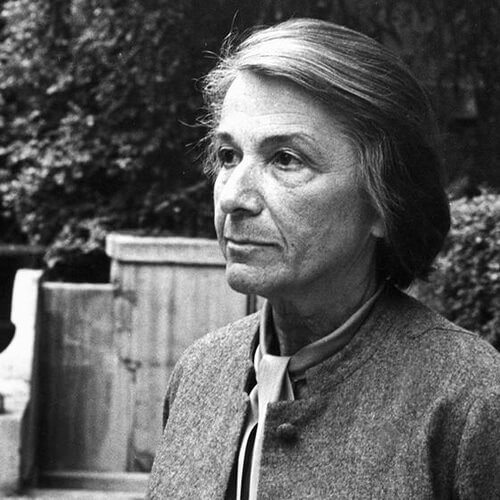
To come back full circle, 1961 was the anniversary of Virginia Woolf’s death, so I suggested I could cover her for Les Lettres françaises. I had a two-page spread where I wrote what I called “Virginia’s Room,” a reference to Jacob’s Room, her novel. And for that I went to England and talked to everyone who was close with Virginia Woolf. I met Leonard Woolf, her husband, and I became very close with him when I was doing my dissertation. I met Clive Bell, who was married to Virginia Woolf’s sister, Vanessa, who was actually dying at the time. I met Vita Sackville-West — Orlando — in the Sissinghurst Castle, which was amazing.
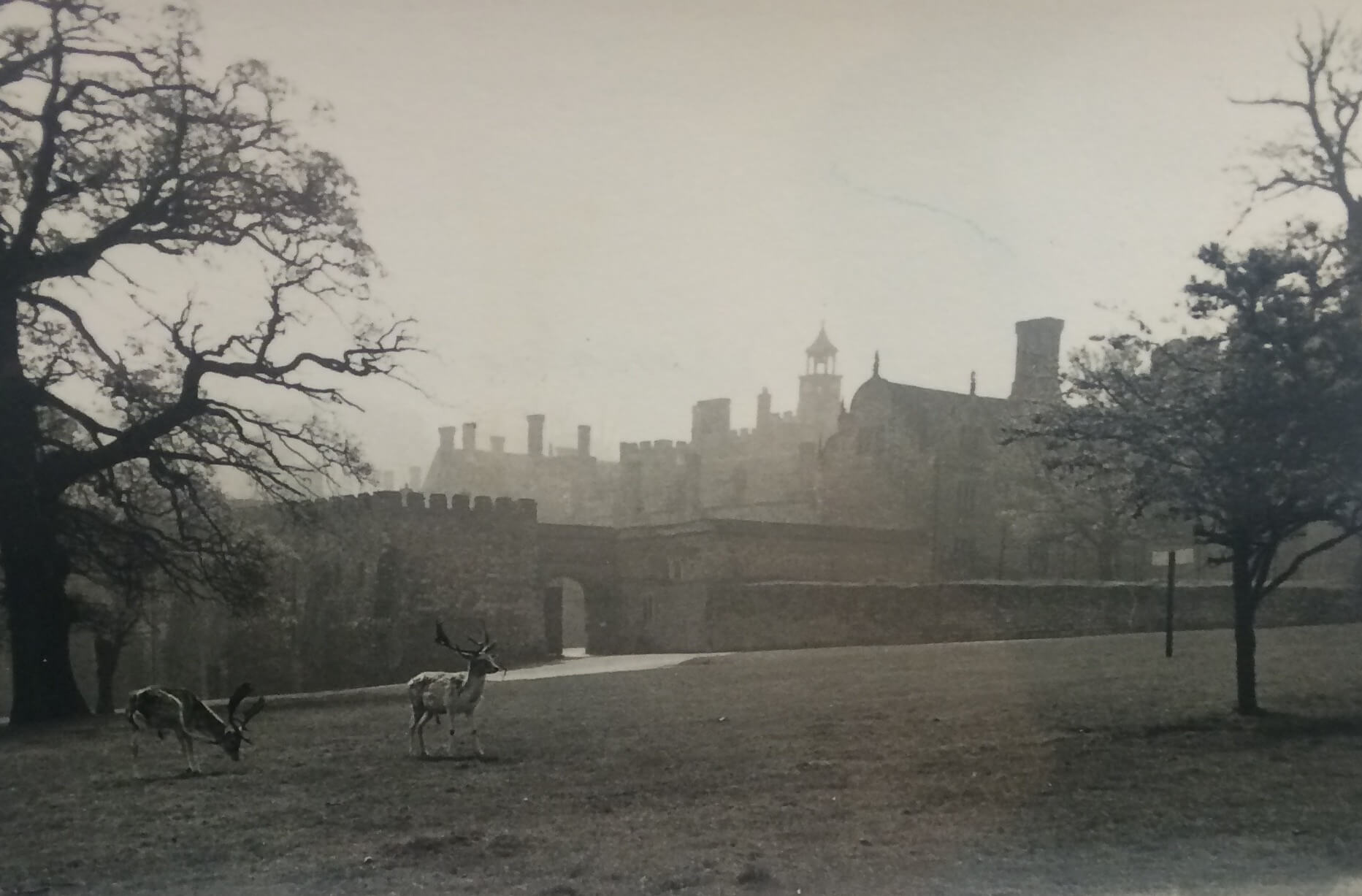
Since I was not trained in English but was very interested in English, I passed an extra exam and became a reporter for Les Lettres françaises in England. I was reporting on everything. I knew more about what was happening in England at the time than in France, which was very interesting. I had one foot in each country. Basically I was going there and interviewing people and reporting on plays. 1964 was the anniversary of Shakespeare, so I went to England ten times that year and saw all the various interpretations, although my English wasn’t so good and I was reading the plays in French.
I was also interviewing other people. I put together a special issue on Dickens, for which Picasso made a drawing. Pierre Daix was a close friend of Picasso, so although I never met Picasso, when we needed something at Les Lettres françasies, Pierre Daix could ask him to contribute. Pierre Daix was the husband of Anne Villelaur, and what I didn’t like so much is that she was the one who was agreeing to projects, which meant you always had to be on her good side. And there were things happening there that I didn’t know, like who was sleeping with who and stuff like that. I try to stay away from it all. But I wasn’t pleased to be dependent. Whenever I had a project I had to be on their good side, so that’s one of the reasons why I didn’t go on after ten years with Les Lettres françaises. I could have gone on forever, and I actually envisaged that, because I thought it was a good thing to have one foot in being a writer. But at the time I was also working for French television.
When was that?
It was 1962-63.
What were you doing for television?
At first I made two films about literature, and they were fairly elaborate. I made a genealogy of the way Rabelais was illustrated, for example, and I even got reviews for these little films. Later, when I came back from Turkey, I went back to television, but then it was for the big television. I was working with two major journalists and I was preparing their political programs on Cypress and Nazism and stuff like that. I was free to choose whatever I wanted to work on.
So all along, you see what I mean, I was in a position to be a freelance. But also free in that I could immediately beam what interested me to television, to magazines, to the Maison des Lettres. And I was interested in so many things. I could always use one for the other — the background was so rich at the time. It was soon the beginning of Structuralism. I took classes with Roland Barthes in 1963, and that was something. I would meet with him at his place, and he published my very first article in Critique, which was the best magazine in France, the best intellectual magazine, at the time.
Critique, the journal started by Georges Bataille?
Yes.
That was the first time you published not as a journalist but with an academic essay?
Yes, it was on La Princesse de Clèves (1678).
I was also interviewing other people. I put together a special issue on Dickens, for which Picasso made a drawing. Pierre Daix was a close friend of Picasso, so although I never met Picasso, when we needed something at Les Lettres françasies, Pierre Daix could ask him to contribute. Pierre Daix was the husband of Anne Villelaur, and what I didn’t like so much is that she was the one who was agreeing to projects, which meant you always had to be on her good side. And there were things happening there that I didn’t know, like who was sleeping with who and stuff like that. I try to stay away from it all. But I wasn’t pleased to be dependent. Whenever I had a project I had to be on their good side, so that’s one of the reasons why I didn’t go on after ten years with Les Lettres françaises. I could have gone on forever, and I actually envisaged that, because I thought it was a good thing to have one foot in being a writer. But at the time I was also working for French television.
When was that?
It was 1962-63.
What were you doing for television?
At first I made two films about literature, and they were fairly elaborate. I made a genealogy of the way Rabelais was illustrated, for example, and I even got reviews for these little films. Later, when I came back from Turkey, I went back to television, but then it was for the big television. I was working with two major journalists and I was preparing their political programs on Cypress and Nazism and stuff like that. I was free to choose whatever I wanted to work on.
So all along, you see what I mean, I was in a position to be a freelance. But also free in that I could immediately beam what interested me to television, to magazines, to the Maison des Lettres. And I was interested in so many things. I could always use one for the other — the background was so rich at the time. It was soon the beginning of Structuralism. I took classes with Roland Barthes in 1963, and that was something. I would meet with him at his place, and he published my very first article in Critique, which was the best magazine in France, the best intellectual magazine, at the time.
Critique, the journal started by Georges Bataille?
Yes.
That was the first time you published not as a journalist but with an academic essay?
Yes, it was on La Princesse de Clèves (1678).
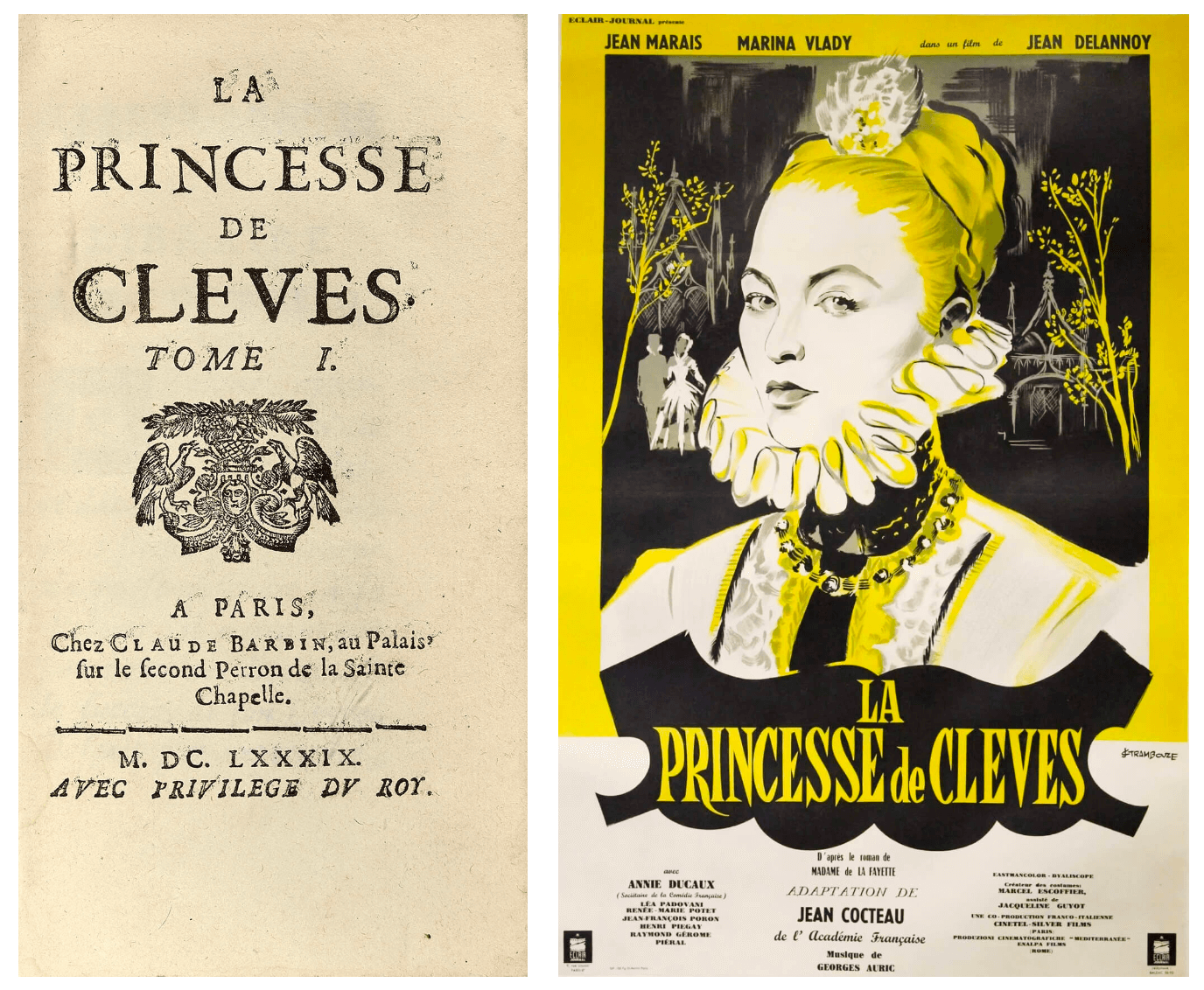
I was writing a theory of the novel, a bit like Goldmann, and Lukács, who wrote a theory of the novel. I was writing a structural analysis that went from Homer to Robbe-Grillet. There were twelve different chapters. Unfortunately when I finished it I started having doubts about Structuralism. Around that time Goldmann had an opening to a series and wanted to publish my dissertation about Virginia Woolf, but I was second-thinking that one too, because I wanted to rewrite parts of it. Goldmann died six months later. I was left with the dissertation, so I said, oh well. I eventually made the theory of the novel into a book, but I never looked for a publisher. It’s in the archive. I was always very ambivalent about publishing everything. Not that I was hesitant. But the effort of doing it and all that, it didn’t seem worth it. So basically I was doing things and just letting them go. I’ve always been like that, all my life. So in other words, I haven’t done so much in my life.
Next:
